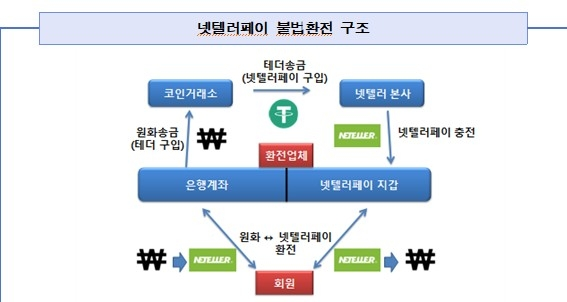South Korean authorities have dismantled a criminal syndicate that collected hundreds of billions of won (approximately $3.2 million) in commissions through fraudulent foreign exchange operations utilizing Neteller Pay, an overseas electronic payment platform similar to Cash App but without global restrictions.
According to South Korean news agency Yonhap, the Busan Western District Prosecutors’ Office’s 3rd Criminal Division announced on June 26th that it had indicted two money exchange companies and three operators without detention for violating the Foreign Exchange Transactions Act and the Electronic Financial Transactions Act.
Prosecutors indicated they are continuing their investigation into five additional individuals involved in operating other money exchange businesses.
The prosecution alleges that the indicted money changers and operators illegally facilitated currency exchanges over a six-year period from 2019 to 2024, collecting funds from ordinary citizens and processing them through Neteller Pay.
Authorities confirmed that the three unregistered money changers processed a total of 943.4 billion won using fraudulent currency exchange schemes, collecting approximately 25.7 billion won ($18.92 million) in commissions. The cumulative transaction volume from these illegal operations reached around $694.5 million.
During the fraud investigation, prosecutors tracked accounts and virtual assets, seizing approximately 12.4 billion won in assets held under false names by the money changer operators and their associated corporations.
Additionally, investigators discovered that suspects had concealed approximately 4.4 billion won worth of Ethereum in personal virtual asset wallets to evade detection by authorities.
Are Overseas Payment Platforms Becoming Korea’s New Fraud Frontier?
Neteller Pay is commonly utilized on overseas gambling platforms prohibited in Korea and for FX margin trading, where individuals profit from foreign exchange rate fluctuations.
The service operates in over 200 countries and supports cryptocurrency deposits and withdrawals across more than 30 digital currencies, making it an attractive option for online merchants, gambling platforms, and cryptocurrency traders.
This case contributes to the escalating pattern of crypto-related fraud in South Korea. In May, South Korean police arrested 28 individuals suspected of orchestrating a cryptocurrency investment fraud scheme that defrauded approximately 50 victims of a combined $1.3 million.
The group allegedly convinced victims to purchase cryptocurrency tokens purportedly scheduled for listing on major exchanges, promising significant returns on investments that ultimately proved to be worthless.
Three months prior, prominent South Korean crypto figure Park “Jonbur Kim,” known as the “Coin King,” was arrested on fraud charges shortly after being released on bail for a separate cryptocurrency scam.
Park and his associate allegedly orchestrated the fraudulent issuance and listing of Artube coin, manipulating its price and misleading investors through false disclosures, resulting in 68 billion won ($47 million) in financial losses.
Is South Korea’s $130 Billion Crypto Market Under Siege from Fraud Rings?
Despite these ongoing scams, South Korea continues to experience growing cryptocurrency adoption, leading the East Asian region in cryptocurrency value received at approximately $130 billion, according to a 2024 Chainalysis report.
The report indicates that centralized exchanges represent the most popular service category in East Asia, accounting for 64.7% of cryptocurrency value received.
As a leading technology nation, South Korea provides accessible digital asset trading through mobile applications and desktop platforms.
The report shows that public interest in cryptocurrency intensified, particularly after Bitcoin exceeded $70,000 in January 2024.
The post South Korean Police Bust Fake Crypto Exchange Ring, Seize $3.2M Worth Of Crypto appeared first on Cryptonews.


 South Korean crypto figure "Jonbur Kim" Park, the ‘Coin King,’ faces re-arrest over a $47M Artube Coin scam as authorities intensify their crackdown on crypto scams.
South Korean crypto figure "Jonbur Kim" Park, the ‘Coin King,’ faces re-arrest over a $47M Artube Coin scam as authorities intensify their crackdown on crypto scams. Eight commercial South Korean banks have joined to establish a won-linked stablecoin that comprises two initial models – trust-based and deposit-linked.
Eight commercial South Korean banks have joined to establish a won-linked stablecoin that comprises two initial models – trust-based and deposit-linked.